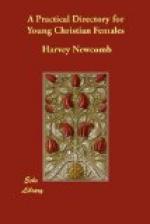But, it becomes a matter of serious inquiry to know what is meant by bringing forth fruit in his season. The apostle Paul says, “The fruit of the Spirit is in all goodness, and righteousness, and truth.” Hence, we conclude, that bringing forth fruit in season must be carrying out the principles of the gospel into every part of our conduct. In another place, the same apostle informs us more particularly what are the fruits of the Spirit: “The fruit of the Spirit is love, joy, peace, long-suffering, gentleness, goodness, faith, meekness, temperance.” Let us, then, carry out these principles, and see what influence they will have upon the Christian character. Love is something that can be felt. It is an outgoing of heart towards the object loved, and a feeling of union with it. When we have a strong affection for a friend, it is because we see in him something that is lovely. We love his society, and delight to think of him when he is absent. Our minds are continually upon the lovely traits of his character. So ought we to love God. The ground of this love should be the infinite purity, excellence, and beauty of his moral perfections, independent of our relations to him. He is infinite loveliness in himself. There is such a thing as feeling this love in exercise. In the Song of Solomon, love is said to be “strong as death.” Surely, this is no faint imagery. Is it possible for a person to exercise a feeling “as strong as death,” and yet not be sensible of it? Love takes hold of every faculty of soul and body. It must, then, be no very dull feeling. Again; the warmth and the settled and abiding nature of love are represented by such strong language as this: “Many waters cannot quench love, neither can the floods drown it.” Surely this can be no fitful feeling, which comes and goes at extraordinary seasons. It must be a settled and abiding principle of the soul; though it may not always be accompanied with strong emotions. We may sometimes be destitute of emotion towards the friends we love most. But, the settled principle of esteem and preference is abiding; and our attention needs only to be called to the lovely traits in our friend’s character, to call forth emotion.
David, under the influence of this feeling, breaks forth in such expressions as these: “My soul thirsteth for thee; my flesh longeth for thee:” “As the hart panteth for the water-brooks, so panteth my soul after thee, O God: My soul thirsteth for God, for the living God:” “My soul longeth, yea, even fainteth, for the courts of the Lord; my heart and my flesh crieth out for the living God:” “My soul breaketh for the longing it hath unto thy judgments at all times.” Surely there is no dulness, no coldness, in such feelings as these. They accord with the spirit of the command, “Thou shalt love the Lord thy God with all thine heart, and with all thy soul, and with all




